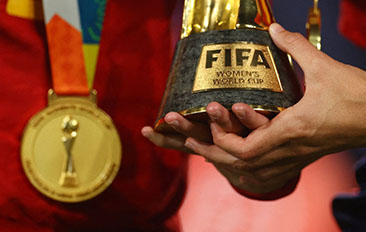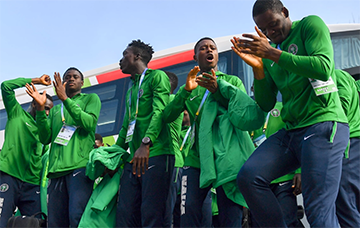WOMEN'S FOOTBALL
South African’t as Dutch march past into quarter-finals
Jill Roord scored her fourth goal of the tournament as the Netherlands marched into the quarter-finals of the Women’s World Cup with a 2-0 win over South Africa at Sydney Football Stadium on Sunday.
Roord’s header gave her side an early lead and Lineth Beerensteyn added the second goal courtesy of a goalkeeping error in the second half to secure the Dutch a date with Spain in Wellington on Friday.
The 54th-ranked African champions never gave up the fight in their first appearance in the World Cup knockout stage and were always a threat on the break through their lone striker Thembi Kgatlana.
Dutch goalkeeper Daphne van Domselaar was equal to everything Banyana Banyana fired at her, however, and the 2019 finalists progressed to the last eight for the second successive tournament.
“I’m very happy with a good win against a tough opponent,” said Netherlands coach Andries Jonker. “But the part of me that wants great football is disgruntled with the first half, where we gave the ball away too much.
The noon kickoff – primetime in the United States – was tailor-made for the reigning champion Americans, but they were packed off to Melbourne to face Sweden later on Sunday after the Netherlands hammered Vietnam 7-0 to win Group E.
The Dutch started well, taking the lead from a corner in the ninth minute, when Danielle van de Donk headed the ball towards goal and defender Lebohang Ramalepe got in goalkeeper Kaylin Swart’s way to present Roord with a simple finish.
Banyana Banyana responded immediately, striker Thembi Kgatlana’s fine first touch on a through ball, giving her space to unleash a shot that forced a save out of Van Domselaar.
Kgatlana was a constant warning to the Dutch against complacency.
She got three shots away in the 10 minutes before halftime that tested Van Domselaar, who also had to be at her best to stop a Kholosa Biyana piledriver in stoppage time.
Ten minutes into the second half, winger Lieke Martens had a goal disallowed for offside, but the Dutch did double the lead in the 68th minute.
Beerensteyn was played through and shot across Swart, who appeared to have the everything under control but fumbled her catch and watched the ball squirt into the net.
South Africa again responded to conceding a goal but Van Domselaar was again equal to it, getting down low to turn Linda Motlhalo’s low drive around the post five minutes later.
Banyana Banyana had one last chance to get on the scoreboard in stoppage time, almost inevitably through Kgatlana, but there was no way past Van Domselaar.
“Yesterday we spoke about needing to score more goals and we had the opportunities, especially in the first half,” said South Africa coach Desiree Ellis.
“I’m just proud, disappointed of course, but really proud of this group of players.”
-Reuters
WOMEN'S FOOTBALL
Two Nigerian women’s clubs get financial boost from FIFA

Following the record-setting FIFA Women’s World Cup Australia and New Zealand 2023, 1,041 clubs from 48 FIFA Member Associations across all six confederations are to receive a share of the revenue for the release of players who participated in the tournament.
Going by the final list of players submitted by the Nigeria Football Federation (NFF) to the tournament, two domestic club sides, Abia Angels and Rivers Angels will profit from the $11 million largess.
The funds have been made available via FIFA’s Club Benefits Programme (CBP), which was introduced ahead of the FIFA Women’s World Cup France 2019 to recognise the fundamental role that clubs play in developing players. The total amount committed to clubs that released and/or trained the stars of women’s football rose to USD 11.3m for the 2023 edition of the FIFA Women’s World Cup™ from USD 8.48m four years earlier.
Nearly two million fans at the tournament’s ten stadiums – and two billion following around the world – witnessed a new standard of women’s football at last year’s FIFA Women’s World Cup, and now the clubs that played integral roles in shaping the talents of all 736 players at the tournament are to be rewarded.
“Strong clubs are crucial to the growth of women’s football, so distributing funding to over 1,000 clubs that have been instrumental in developing the world’s top female footballers is just one way that FIFA can offer its support,” said FIFA President Gianni Infantino yesterday.
“What’s truly unique about this programme is that FIFA does not only reward the clubs that released the players for the tournament but also the clubs that have contributed to each player’s development between the ages of 12 and 22.
This development also means that most of the players who began their careers in Nigeria before their sojourn overseas will benefit from the gesture from the world football body.
“This model ensures that crucial funding as well as the incentive for clubs to provide the best possible training and environment for female talent – reaches every part of the global football ecosystem, benefiting grassroots and professional clubs.”
The number of clubs that were identified by FIFA as eligible to receive payments via the FIFA Women’s World Cup 2023 CBP increased by 219 clubs from 822 in 2019 to 1,041 in 2023. Positively, the number of clubs across FIFA’s Member Associations also increased from 39 in 2019 to 48 in 2023.
Each club’s share has been determined by the role that they played in a player’s development or participation in the tournament, either as a releasing club, a training club, or both.
Each eligible releasing club will receive an equal amount per player per day at the tournament, counting from the beginning of the release period (10 July 2023) and finishing the day following the last match of the player’s national team at the tournament.
Each training club will receive an amount based on the number of training periods the player spent at the club between ages 12 and 22, with each year consisting of a maximum of two training periods. The number of days that the player spent at the tournament is also factored in, however, the number of minutes played by a player in any given match at the tournament is irrelevant, with all players treated equally based on the number of days that they were at the tournament.
In the 1,043 clubs, UEFA dominated in numbers with 581 Asia Federation was next with 151 clubs while CONCACAF was next with 108 just as COMEBOL followed with 95 and then CAF with 76 clubs and Oceania Federation took the rear with just 30 clubs.
WOMEN'S FOOTBALL
CAF Women’s Champions League Qualifiers draw holds on Wednesday

The 2024-2025 women’s interclub football season will officially kick off on Wednesday, 24 July, with the draw for the CAF Women’s Champions League qualifiers in 4 zones: UNAF, UNIFFAC, WAFU B and CECAFA.
The draw will be conducted at 10:00 GMTat the CAF Headquarters in Egypt and live-streamed on CAF TV and CAFOnline.com.
Below are the teams entered by zone and the dates of the qualifying tournaments:
WAFU B (10 – 23 August): Ainonvi FC (Benin), Hasaacas Ladies (Ghana), Inter d’Abidjan (Côte d’Ivoire), AO Étincelles OU USFA (Burkina Faso), AS Garde Nationale (Niger), Edo Queens (Nigeria), ASKO de Kara (Togo).
UNAF (21 – 31 August): CF Akbou (Algeria), Tutankhamun (Egypt), AS Far (Morocco), ASF Sousse (Tunisia)
CECAFA (17 August – 4 September): PVP Buyenzi (Burundi), FAD (Djibouti), CBE FC (Ethiopia), Kenya Police Bullets (Kenya), Kawempe Muslim (Uganda), Rayon Sports (Rwanda), Yei Joint Stars (South Sudan), Simba Queens (Tanzania), Warriors Queens (Zanzibar)
UNIFFAC (16 – 24 August): Lekié FF (Cameroon), TP Mazembe (DR Congo), Atlético de Malabo (Equatorial Guinea), CSM Diables Noirs (Congo)
WOMEN'S FOOTBALL
Colombia 2024: Danjuma invites 32 as countdown begins to Final Tournament

With just eight weeks to their first match of the FIFA U20 Women’s World Cup Colombia 2024, Head Coach Chris Musa Danjuma has called up four goalkeepers, eight defenders, eight midfielders and 12 strikers to a training camp in the Federal Capital, Abuja in the first phase of preparation for the global tournament.
Team captain Oluchi Ohaegbulem is top of the list, with first-choice goalkeeper Faith Omilana, defenders Shukurat Oladipo and Comfort Folorunsho, midfielders Chinyere Kalu, Adoo Yina and Rofiat Imuran, and forwards Janet Akekoromowei, Flourish Sabastine and Aminat Bello also called.
Nigeria, a fixture at the FIFA U20 Women’s World Cup finals since the tournament began as an U19 event in Canada 22 years ago, will contend with three-time winners Germany, Asian powerhouse Korea Republic and South American representatives Venezuela in group D of the competition scheduled for three Colombian cities, 31st August – 22nd September.
All the invited are expected at Serob Legacy Hotel, Wuye, Abuja on Sunday, 7th July.
ALL THE INVITED PLAYERS:
Goalkeepers: Anderline Mgbechi (Delta Queens); Rachael Unachukwu (Nasarawa Amazons); Faith Omilana (Naija Ratels); Shukura Bakare (Nasarawa Amazons)
Defenders: Oluchi Ohaegbulem (Nasarawa Amazons); Jumoke Alani (Nasarawa Amazons); Shukurat Oladipo (FC Robo Queens); Oluwabunmi Oladeji (Naija Ratels); Folashade Adegbemile (Delta Queens); Chidera Okenwa (Delta Queens); Comfort Folorunsho (Edo Queens); Taiwo Lawal
Midfielders: Adoo Yina (Nasarawa Amazons); Olushola Shobowale (Nasarawa Amazons); Aminat Folorunsho (Rivers Angels); Chioma Olise (Edo Queens); Chinyere Kalu (Nasarawa Amazons); Joy Igbokwe (Naija Ratels); Rofiat Imuran (Stade de Reims, France); Zikora Agama (Naija Ratels)
Forwards: Delight Nwosu (Dannaz Ladies); Adaobi Okah (Remo Stars Ladies); Chiamaka Okwuchukwu (Rivers Angels); Chinaza Agoh (Delta Queens); Mary Nkpa (Heartland Queens); Chiamaka Osigwe (Edo Queens); Janet Akekoromowei (Asisat Academy); Mary Offor (Adamawa Queens); Flourish Sabastine (Stade de Reims, France); Sharon Ulumma (Heartland Queens); Aminat Bello (Otero College, USA); Reilly Adebowale (Bohemian FC, Republic of Ireland)
-

 Nigerian Football1 week ago
Nigerian Football1 week agoI prefer a foreign coach for the Super Eagles, says Amaju
-

 Olympics5 days ago
Olympics5 days agoBrazilian women train in Zidane’s birthplace ahead of Nigeria Super Falcons clash
-

 Premier League1 week ago
Premier League1 week agoNigerian-born Man United’s new striker promises creativity and unpredictability to fans
-

 Olympics12 hours ago
Olympics12 hours agoThis is my story: Odegbami on how he is stranded in London
-

 Nigerian Football1 week ago
Nigerian Football1 week agoOsimhen’s outburst was a moment of madness, says Amaju
-

 Olympics6 days ago
Olympics6 days agoTeams plan for lack of toilets on Paris opening ceremony barges
-

 OBITUARY1 day ago
OBITUARY1 day agoBREAKING! Former Heartland FC owner, Iwuanyanwu, dies at 81
-

 Olympics1 week ago
Olympics1 week agoWhat you need to know about the Paris 2024 Olympics opening ceremony


